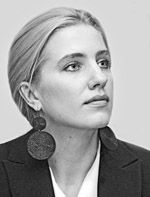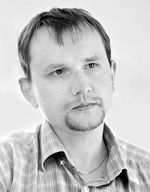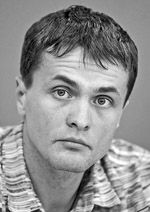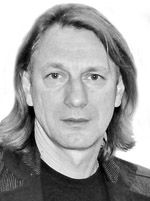As previously repeatedly stated by The Day, its experts and contributors, Ukrainian society badly needs a quality alternative; that it is important to understand and explain this alternative. In our opinion, active discussions on a new quality level are a way to have it.
On March 15, The Day hosted the roundtable “New Agenda: Opposition and Society,” involving opposition and public sector activists (see website day.kiev.ua, starting at 12:00 Kyiv time), namely UDAR leader Vitali KLITSCHKO; Valentyn NALYVAICHENKO, chairman of Our Ukraine’s Political Council; Andrii PYSHNY, chairman of the Front for Change’s Political Council; Andrii SENCHENKO, member of the Fatherland Party; Volodymyr VIATROVYCH, historian, NGO “SAM”; Ihor KOHUT, chairman of the Council, Laboratory for Legislative Initiatives; Ihor LUTSENKO, head of the NGO “For the Preservation of Old Kyiv”; Ostap KRYVDYK, a non-affiliated analyst; Svitlana ZALISHCHUK, founder of the CHESNO social movement.
This roundtable was moderated by Larysa IVSHYNA, and editor-in-chief of Den/The Day. It was preceded by a poll addressing activists of Ukraine’s civil society. There were three questions:
1. How would you go about changing Ukraine for the better (your five proposals)?
2. What questions would you pose to the opposition in Ukraine?
3. Why would you criticize and/or praise this opposition?
Oleksandr SOLONTAI, expert, Institute of Political Education, founder and coordinator of the Molodizhna Varta Campaign:
“The biggest question is whether our opposition can prove that they want seats in parliament to change Ukraine [for the better] rather than use these seats to win the presidential race and receive absolute power.
“My five proposals are as follows: (1) The president’s powers should be restricted while those of the people should be expanded, thus giving an impetus to the democratization process. (2) Reform in the judicial realm, with the judges being elected [rather than appointed]. (3) Militia [police] reform on a local level. (4) Reform in Ukraine’s youth policy. (5) Budget decentralization and truly free enterprise.
“In regard to the opposition, the ruling party is financed by oligarchs while those in opposition are financed by the people. If so, why the people don’t believe this? Otherwise, what is the difference between the opposition and those currently ‘upstairs’? What are the [opposition] parties planning to do to democratize themselves? Without this democracy is impossible.”
Yevhen DEMCHENKO, leader, Regional Initiatives Foundation:
“I don’t think that an alternative can be modeled or helped by holding public discussions. It will emerge as a manifestation of the will of the people who will have values on a different level; it will rest on a clearly defined ideological platform (ideally, essentially new political forces will appear, capable of finally forming Ukraine’s political system; they will have varying ideologies but will share the nation-state-building idea). This ideological platform may turn out to be something totally unexpected, based on pragmatic ideas rather than the majority’s will; it will show Ukrainians the way to a better way of life, to Ukraine’s proper place in the international community of nations. Well, all this is wishful thinking.
1. “I think there is no sense in seeking an answer to this question. Change [for the better] will start after people realize what they need in the first place; then they will make this change. Even if there is an ideal development action plan, people engaged in what is known as politics won’t be able to implement it.
“Change [for the better] must begin with an ‘epidemic’ of new values, including an allergy to freeloading practices, appreciation of bona fide performance, overcoming the beggar complex, developing respect for the individual. The people of Ukraine must change, otherwise there will be no adequate Ukrainian state. Everyone must be provided conditions for self-realization. Here a number of approaches are possible that can’t be described in several words.”
2. “I have no questions for what you refer to as the Ukrainian opposition.”
3. “Current politicians should be thanked for making clearly apparent the need in all possible alternatives.”
Svitlana ZALISHCHUK, coordinator, Chesno Civic Initiative:
1. “(a) Fair and transparent elections in 2012 and 2015 to secure democratic upper-echelon cadre rotation; (b) creating of a healthy economic development model, including rigid anti-corruption legislation and its strict implementation; upgrading of the economy; foreign inland investments; (c) upgrading of the education system, using international experience and uprooting corruption; (d) active implementation of reforms within the framework of a new agreement with the Council of Europe.”
2. “Chesno aims at checking all candidate MPs by using the following six simple bona fide criteria: (a) a candidate must not be corrupt; (b) s/he must not violate human rights [and liberties]; (c) this candidate must be an active communal member; (d) this candidate must be at the Verkhovna Rada during the vote; (e) s/he must go to work on a regular basis; (f) this candidate must declare his/her wealth.
“Is the opposition prepared to reaffirm its alternative nature by publicly accepting these criteria and nominate bona fide candidates in its electoral districts?”
3. “Criticism: (a) the opposition doesn’t propose an actual alternative to the existing political system; (b) the opposition doesn’t offer a balanced and coordinated national development strategy – lashing out at those currently ‘upstairs’ isn’t enough; (c) the opposition is manifestly passive in protecting the rights of a civil society, journalists, and other social groups.”
Volodymyr VIATROVYCH, historian, NGO “SAM”:
1. “To quote from Mahatma Gandhi, ‘A policy is a temporary creed liable to be changed, but while it holds good it has got to be pursued with apostolic zeal.’ Sad but true: the situation in this country, those currently in power are a reflection of all of us. Therefore, to change the existing regime we have to start by changing ourselves. Talking about the forthcoming elections, change for the better will start not after changing the politicians at the political helm, but after changing those who cast their ballots for them; after the electorate stops casting ballots the way they feel and begins casting them using their brains and proceeds to monitor their nominees’ performance.”
2. “I would like to hear the opposition’s concrete action plan before the 2012 elections. So far all we have is their declarations about combining efforts, just words and no deeds. Another very important question is: ‘What will happen if and when they come to power?’ Today’s opposition is made up of people who stood perhaps the best chance in the history of independent Ukraine, back in 2004-05. They had five years during which period they could have implemented a number of their initiatives. They never did, probably for the want of insistence and consistence.”
3. “The opposition should be criticized for its inability to make concrete deeds. In fact, this opposition’s political presence is inadequate, even though the absolute majority in this society is dissatisfied with the current situation. This opposition should be praised for its very existence. I hope it will continue to exist and will reach a better quality level when it will be able to make its presence more obvious and try to improve the situation in this country.”
Ihor LUTSENKO, leader, NGO “For the Preservation of Old Kyiv”:
1. “Judicial and law enforcement reform comes first. Second, formalization of property rights. In other words, we need a legal framework to secure the proprietor’s status, so this owner can lease out, sell or make a gift of his property.”
2. “Honestly, I have never been in close contact with the opposition. The opposition must answer this question: ‘What are you actually doing?’ It has its status and political vehicles, along with experts in jurisprudence, financial resources, so what has it actually accomplished?”
3. “The range of criticism this opposition deserves is so big, I can hardly specify it. I would praise opposition members who, despite their colleagues’ absolute inactivity, are trying to resolve problems relating to Ukrainian citizens, showing dedication and good judgment.”
Ihor KOHUT, council chairman, Laboratory of Legislative Initiatives:
1. “First is trust, when the political elite show with their own example how one should sacrifice his fortune so that the state could be able to overcome the difficulties. Second is solidarity, when people believe in one another and are willing to build common future. The third is education. The next thing will be to abandon center-Ukrainian position because the world is now globalized. Then self organization is needed, when people are able to unite and settle their issues on their own without relying either on state or anybody else. Finally, it is culture-modern art, promoting Ukraine as a modern country. There are a few fundamental things that need to be done: desovietization, democratization, decentralization, and Europeanization of the country.”
2. “We should ask Ukrainian opposition about what they associate Ukraine, the country they would want to live in, with? Accordingly, what needs to be done to implement those qualities in real life?”
3. “The opposition should be criticized for lack of vision. Justice, rule of law, and other general things should be seen in certain aspects, actions. They should offer high-quality and logical alternatives to the actions of the authorities, the kind of alternatives that could be explained and measured. There is yet another question: do they really consider themselves to be democrats and are they ready to organize debates and discussions at various congresses and in the party inner environment? And we could praise them for the fact that they exist, because as long as we have them this democracy has at least some kind of future. The only thing we need to find out is what they fight for: is it only power or do they really have the vision of how to change this country, do they realize that it would be impossible to change the country only with political decisions, it is very important what values they’ll be able to demonstrate.”
Serhii TSYHIPA, head of the Public Association “Kakhovka Springboard”:
1. “Global changes must always begin with yourself. If everyone will be aware of the fact that he is a citizen of Ukraine and his future depends only on him and not on some president, speaker, or political party, then Ukraine will have a chance for a better future.”
2. “If today’s opposition, when it was nominally in power, failed to unite in favor of the people of Ukraine why the present situation should be any different? There is also another question: will they continue seeking ‘moneybags,’ that is businessmen, and by doing so will repeat the mistake Tymoshenko made? When will they start paying attention not to those who could provide financial support for the election campaign but to real leaders in regions?”
3. “I don’t know anything I could praise the opposition for. An average voter who sees that 70 percent of the politicians have changed their party affiliation in one way or the other does not trust anyone. The main issue to be resolved by the opposition is how to win trust of an ordinary citizen back.”
Ostap KRYVDYK, independent analyst:
1. “I would speak about civic changes, immediate changes, rather than about political ones. The first one is transferring politics to the local level, understanding of its impact on everyone. The next step is understanding of concrete interests by everyone. Then people have to seek and find such personalities that are capable of expressing those interests and protect them. The fourth is willingness to sometimes morally and financially support such personalities. And the last thing that needs to be changed: people have to defend their choice and their candidate.”
2. “What is the Action Plan after being elected to the parliament? The minimum task is to win 150 and more mandates, that is preventing the current state authorities from gaining the constitutional majority. The optimum goal would be to win 225 and more seats in the parliament, which is quite realistic according to the recent ratings. The opposition may win over 50 percent of the votes, if united. Thus, I would ask about the action plan until at least 2015, until nominating a single candidate from the opposition for the presidential election, in case of all three possible versions.”
3. “There is lots of negative. I could praise them for conducting negotiations, reaching some common positions, considering several possible formats, for overcoming the peak of mutual overthrowing, mutual destruction of the opposition. One could blame them for that the process is too slow, non-constructive, not transparent, the process of nominating candidates is secretive and opportunistic, the opposition is afraid of publicity, and is not really working with people.”














